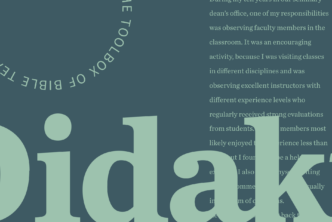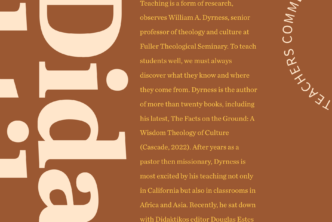Theological education forms students to become biblically, culturally, and doctrinally literate in order to live out their heavenly citizenship on earth. To succeed in this God-glorifying project, it takes not a village but a church—or rather, myriad local churches, each displaying the one faith in many ways. Accordingly, Christian literacy pertains to what every believer needs to know in order to “do” church. This requires the other three forms of literacy as well.
First, every Christian needs to know the place of the church in the story of redemption. Rightly relating Israel to the church requires biblical literacy, the ability to read the many books of the Bible as a unified story of the people that God set apart as his treasured possession to be a holy nation (Exod 19:6; 1 Pet 2:9). Belonging to the church is not like membership in other earthly groups, for one becomes part of the church through baptism, a public confession of the lordship of Christ. Moreover, being a Christian involves more than the salvation of individuals, for the gospel includes the good news that, in Christ, the dividing walls of hostility (Eph 2:14) that bedevil human life on earth are no more.
Second, Christians need cultural literacy to pursue their mission of bringing gospel light to the nations. Culture cultivates forms of life, and it is essential that Christians distinguish the shape of gospel freedom from all counterfeits. The church is a light to the world when it embodies the freedom for which Christ has set us free.
Third, doctrinal literacy helps Christians understand that the church is a theological and not simply sociological entity. They are “of God” (Gal 1:13) because they are born of Word and Spirit. Local churches are the hope of the world, essential ingredients in the economy of redemption, the triune God’s plan “to unite all things in [Christ]” (Eph 1:10). The church is not an appendix to the gospel but its sum and substance. The church must therefore become what it is: a theater of the gospel where the light, life, and love of God are on conspicuous display for the world to see.
Place is the operative term, and considering ecological literacy helps us better appreciate the importance of the local church. Although the church is “of God,” it is also “at Antioch” (Acts 13:1), “at Corinth” (2 Cor 1:1), and at many locations to the ends of the earth. “Eco-” was the German zoologist’s Ernst Haeckel’s term for “place to live” (the term derives from the Greek oikos = “home”).
The church, too, is an ecosystem: the people are the house of God and temple of the Spirit, the place where God indwells his people and where the people live, and move, and have their being in God the Son. Whereas ecological literacy attends to how ecosystems promote biological life, the concern of ecclesiological literacy is the ecosystem we call church, how it functions as a community of organisms, and how its life is for the sake of the life of the world.
Christian literacy is the ability to put one’s understanding of church into practice, knowing how to worship God in spirit and in truth, make disciples, and witness in word and deed to the reconciliation that is in Christ. It also includes knowing how to navigate theological diversity, and how to disagree with other citizens of the gospel. This is a lesson that transcends textbooks, belonging to that stage of post-graduate theological education that the apostle Paul calls maturity in Christ (Col 1:28). One text that nevertheless helps foster Christian literacy for just this predicament is Rhyne Putman’s When Doctrine Divides the People of God.
To conclude: theological education serves the church by fostering Christian literacy, enabling disciples to explain why there is church rather than nothing, and directing the church to say and do things (like ministering reconciliation in Christ) that no other institution can. But theological education costs time, energy, and money. Is it worth it? According to Job, “the price of wisdom is above pearls” (Job 28:18). So is the cost of discipleship, adjusted for inflation—and secularization.
We are living in a secular age, and we need theological education to form citizens able to resist the prevailing social imaginaries so that they can reimagine a story, a story which no greater can be conceived, narrated, or lived out. Theological education serves both church and world by plumbing the depths of just such a story—the gospel—thereby fostering rightly ordered thoughts, desires, and imaginations, all oriented to Jesus Christ, the true north of a new humanity.

***
This article was originally published in the April 2023 issue of Didaktikos. Slight adjustments, such as title and subheadings, may be the addition of an editor.





